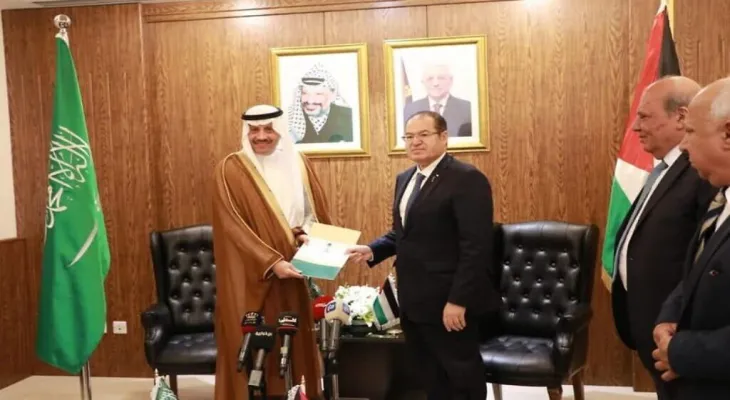Search here
Newspaper
Search here

Arab Canada News
News

Published: August 31, 2023
The Palestinian Authority is seeking to take "irreversible" steps that would enhance its attempts to establish a Palestinian state in the context of negotiations for a normalization agreement between Israel and the Kingdom of Saudi Arabia, according to an American official, a Palestinian official, and a senior Arab diplomat speaking to the Times of Israel.
The proposed steps include U.S. support for recognizing the Palestinian state at the United Nations, reopening its consulate in Jerusalem that has historically served Palestinians, repealing congressional legislation that designates the Palestinian Authority as a terrorist organization, transferring control of West Bank land from Israel to Palestinian control, and demolishing illegal settlements in the West Bank.
The three officials distinguished these types of actions from other proposed measures in the past that Ramallah sees as reversible, such as a temporary Israeli freeze on settlements, or Israel returning to peace negotiations with the Palestinian Authority, or Israel increasing the number of work permits it grants to Palestinians.
The officials stated that the irreversible steps are part of a list that the Palestinian Authority has submitted to both the United States and the Kingdom of Saudi Arabia, adding that the measures will be discussed further during the visit of Palestinian Authority Minister of Civil Affairs Hussein al-Sheikh to Riyadh next week. Al-Sheikh discussed the measures with U.S. Assistant Secretary of State for Near Eastern Affairs Barbara Leaf during a meeting on Sunday and received a largely lukewarm response, according to a Palestinian official.
Biden administration officials have opposed Palestinian proposals regarding the United States, pointing to legislation in Congress that requires the U.S. to cut all funding to the United Nations if the Palestinians are granted full membership status.
As for the consulate in Jerusalem – which served as the actual mission for Palestinians before it was closed by former President Donald Trump in 2019 – U.S. officials saw a need for some degree of Israeli approval, noting that Prime Minister Benjamin Netanyahu's government has rejected that. Additionally, the repeal of 1987 legislation that considers the Palestine Liberation Organization and its affiliates as terrorist organizations was not on the Biden administration’s agenda due to the political ramifications in an increasingly divided Washington.
Instead, the United States has encouraged the Palestinian Authority to soften its demands and redirect them toward Israel instead. The Palestinian official stated that it highlighted the idea of transferring land in Area C of the West Bank, which is under Israeli control, to Areas B or A where the Palestinian Authority has greater authority, a goal that is much more achievable.
On the other hand, the current Israeli government has intensified its demolition of Palestinian buildings in Area C in what it describes as a "battle" for the area, so ceding the same land to the Palestinian Authority is likely to face significant resistance from Netanyahu's far-right coalition partners. Finance Minister Bezalel Smotrich said on Monday that Israel "will not make any concessions to the Palestinians. It's a fantasy."
The Palestinian official who spoke to the Times of Israel expressed frustration with the American response to Ramallah’s proposals, stating that they are willing to discuss significant gestures to Saudi Arabia, but all that they say in response to our proposals is “impossible.”
In fact, senior Biden officials were reported to be considering Saudi Arabia's noble demands in exchange for normalizing relations with Israel, such as a mutual security treaty similar to NATO that would require the U.S. to defend Riyadh if the latter comes under attack; a civilian nuclear program supported by the United States in Saudi Arabia; and allowing the Gulf kingdom to purchase more advanced weapons from Washington.
A separate Palestinian source familiar with the matter noted that the Palestinian Authority has been careful not to label its list as "demands" to avoid being seen as directly complicit in a potential normalization agreement.
The source explained that Ramallah has changed its approach to potential normalization agreements between Israel and its Arab neighbors and is no longer completely boycotting the process or publicly condemning countries that establish diplomatic relations with Israel.
Instead, the Palestinian Authority is seeking to influence the process by separating its various bilateral relationships with countries like Saudi Arabia from the normalization file, with the aim of strengthening both during the process.
In this context, Riyadh is said to have offered to renew its assistance to the Palestinian Authority, in a potential attempt to persuade Ramallah to support normalization efforts with Israel.
The Wall Street Journal reported on Tuesday that Saudi Crown Prince Mohammed bin Salman informed Palestinian Authority President Mahmoud Abbas in April that Riyadh is prepared to resume a package of assistance. The aid has been completely frozen since 2016 amid corruption allegations against the Palestinian Authority and a refusal to hold presidential elections since 2005.
The Palestinian official stated that the Palestinian Authority has also asked Saudi Arabia to establish a consulate in East Jerusalem. Riyadh agreed to meet Ramallah halfway, appointing its ambassador to Jordan as a non-resident ambassador to Palestine and a consul general in Jerusalem earlier this month.
The Palestinian official noted that it is worth mentioning that this step was not coordinated with the Biden administration.
Comments